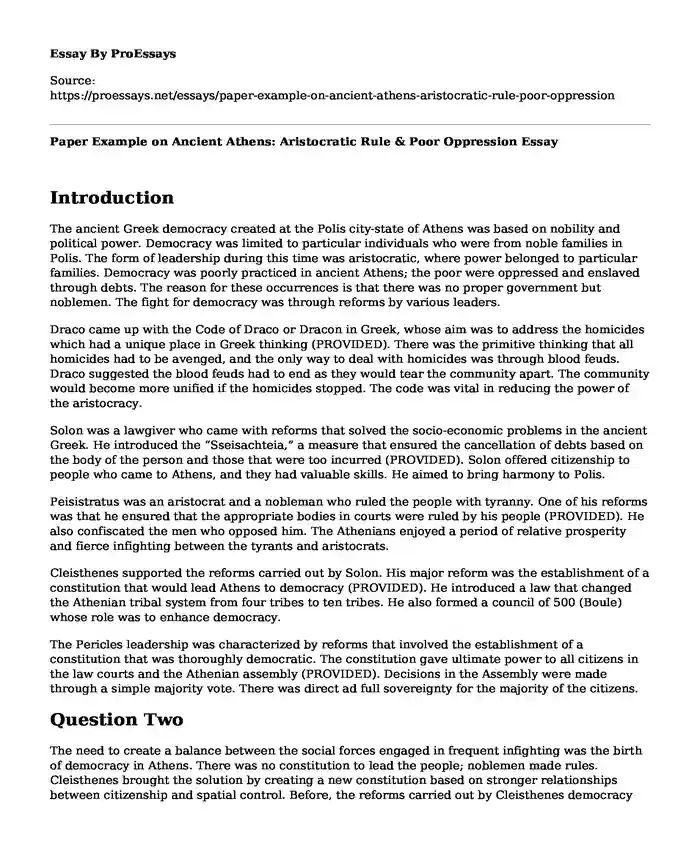Introduction
The ancient Greek democracy created at the Polis city-state of Athens was based on nobility and political power. Democracy was limited to particular individuals who were from noble families in Polis. The form of leadership during this time was aristocratic, where power belonged to particular families. Democracy was poorly practiced in ancient Athens; the poor were oppressed and enslaved through debts. The reason for these occurrences is that there was no proper government but noblemen. The fight for democracy was through reforms by various leaders.
Draco came up with the Code of Draco or Dracon in Greek, whose aim was to address the homicides which had a unique place in Greek thinking (PROVIDED). There was the primitive thinking that all homicides had to be avenged, and the only way to deal with homicides was through blood feuds. Draco suggested the blood feuds had to end as they would tear the community apart. The community would become more unified if the homicides stopped. The code was vital in reducing the power of the aristocracy.
Solon was a lawgiver who came with reforms that solved the socio-economic problems in the ancient Greek. He introduced the “Sseisachteia,” a measure that ensured the cancellation of debts based on the body of the person and those that were too incurred (PROVIDED). Solon offered citizenship to people who came to Athens, and they had valuable skills. He aimed to bring harmony to Polis.
Peisistratus was an aristocrat and a nobleman who ruled the people with tyranny. One of his reforms was that he ensured that the appropriate bodies in courts were ruled by his people (PROVIDED). He also confiscated the men who opposed him. The Athenians enjoyed a period of relative prosperity and fierce infighting between the tyrants and aristocrats.
Cleisthenes supported the reforms carried out by Solon. His major reform was the establishment of a constitution that would lead Athens to democracy (PROVIDED). He introduced a law that changed the Athenian tribal system from four tribes to ten tribes. He also formed a council of 500 (Boule) whose role was to enhance democracy.
The Pericles leadership was characterized by reforms that involved the establishment of a constitution that was thoroughly democratic. The constitution gave ultimate power to all citizens in the law courts and the Athenian assembly (PROVIDED). Decisions in the Assembly were made through a simple majority vote. There was direct ad full sovereignty for the majority of the citizens.
Question Two
The need to create a balance between the social forces engaged in frequent infighting was the birth of democracy in Athens. There was no constitution to lead the people; noblemen made rules. Cleisthenes brought the solution by creating a new constitution based on stronger relationships between citizenship and spatial control. Before, the reforms carried out by Cleisthenes democracy and citizenship in Athens were mainly based on bloodlines or social class. For instance, for one to become a citizen, you had to have a father from Athens. The source of political power was bloodline and the fortunes or wealth a family-owned.
People who belonged to the lower social classes had difficulties in gaining citizen and enjoying democracy. There were constant fights between the tyrants and aristocrats in their aim to have some power over Athens. The tyrants favored people who belonged to the working class and were against the aristocrats. Moreover, the right to participate in political activities was limited to male citizens and adults, 18 years old and above. Thus, women, slaves, and resident aliens were excluded from political participation.
Thus, to ensure everyone was free to have citizenship and enjoy democracy, the rift between the lower social class groups and the aristocrats had to be ended. Cleisthenes came with a constitution that ensured everyone could enjoy the privileges of being an Athenian. The constitution was essential at fostering the political objective of re-aggregating the Athenians. Once registered within the demos, every citizen had the right to pass his opinions and vote in the general assembly. The reforms saw the source of power shift from blood to land, where power was distributed across the entire population on a territorial basis. Thus, the constitution was used to ensure that social classes and political power did not determine the democratic rights.
Cite this page
Paper Example on Ancient Athens: Aristocratic Rule & Poor Oppression. (2023, Oct 27). Retrieved from https://proessays.net/essays/paper-example-on-ancient-athens-aristocratic-rule-poor-oppression
If you are the original author of this essay and no longer wish to have it published on the ProEssays website, please click below to request its removal:
- Essay on The Emergency Food Assistance Program (TEFAP)
- The Oil and Gas Industry Challenges in the Global Industry Research Paper Example
- 1920s US Economy: Uneven Fortune, Low Wages, and Political Anxiety - Essay Sample
- White Nationalism: The Need to Fight Inequality - Essay Sample
- Paper Sample on Yemen: World's Worst Humanitarian Crisis of the Decade
- Essay Sample on Mexican American Women's Rebellion Against Social Conventions During WWII
- Addressing Substance Abuse in Schools: Challenges, Interventions, and Comprehensive Policies - Free Report







